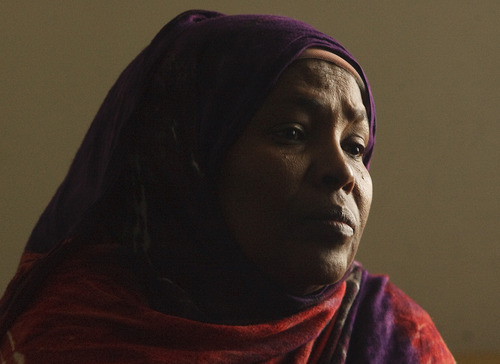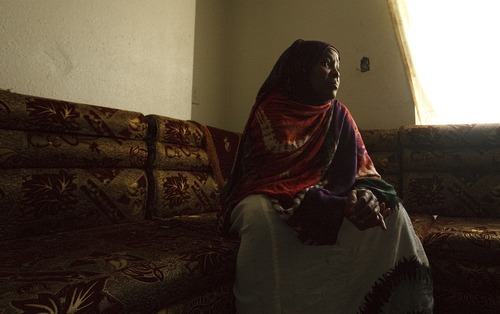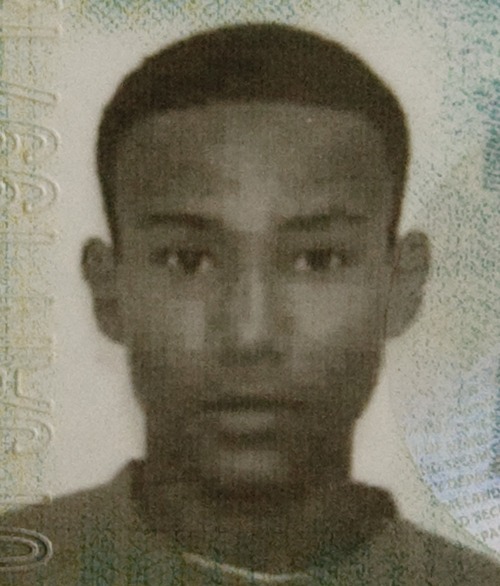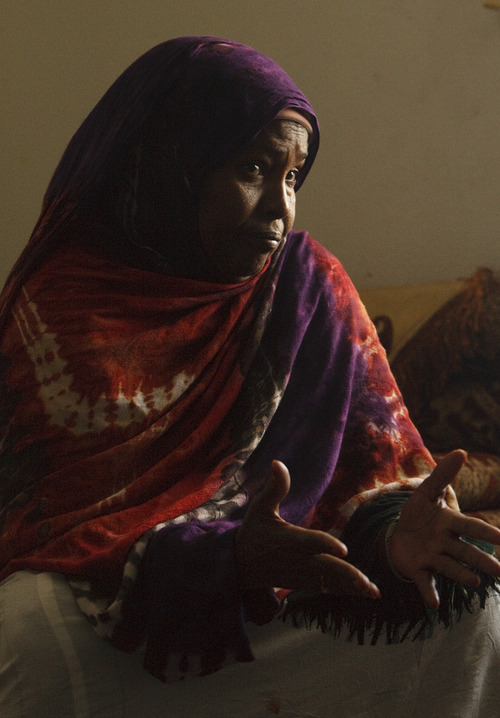This is an archived article that was published on sltrib.com in 2012, and information in the article may be outdated. It is provided only for personal research purposes and may not be reprinted.
Her voice stayed strong as she recounted the attack, step by step: night's darkness, the knife's blade, his demands, and her tears — how she tried so hard to hold them back, but how they came, and still do after one of the nightmares she cannot escape.
But another woman the man raped the next night could not bring herself to speak in the courtroom that day. She, too, was assaulted at knifepoint and then forced to take him to an ATM.
The machine's security camera eventually led police to the perpetrator. He would later tell investigators he wanted the money so he didn't have to wear stained clothes on the first day of ninth grade.
Mohammed Ali Mohammed turned 15 while being held on charges of raping the two women in August 2011. Still a few weeks shy of his 16th birthday, the teenager recently pleaded guilty to crimes that could keep him in a youth facility until he is 21, at which point it will be up to a judge to decide if he should serve more time as an adult.
"I think he is getting away with less than he deserves," his first victim said in a Salt Lake City courtroom in October. "I want him in prison. ... I want to have him feel what I felt."
—
'Lawless' refugee camps • According to charges filed in 3rd District Juvenile Court, Mohammed, then 14, raped the two women on consecutive nights in Salt Lake City.
On Aug. 14, the teen allegedly came up behind a woman who was outside her house with a dog and held a four-inch switchblade to her throat. He threatened to cut her if she screamed, the charges state, then raped her behind the home.
The following night, the boy broke into another woman's home. He looked through drawers in the house before raping the woman, according to charging documents.
The teen then forced the woman to go to an ATM and withdraw $400 for him, the charges state.
Earlier this year, Mohammed pleaded guilty in juvenile court to three felony level charges and was ordered to a secure detention facility. The teen also pleaded guilty to three felony charges as an adult.
Whenever he is released from the youth facility, it will be up to a judge to decide whether to send him to prison.
One victim said she wanted the teen to be sent back to the country from which he came.
Mohammed's family and defense attorney say that's where his troubles began.
Zahra Mohammed said she and her family fled Somalia to Yemen in 1992. Her son was born in a refugee camp there, away from the civil conflict in Somalia but not free from violence.
As a young boy, he watched as a thief killed his older brother before attacking him, Zahra Mohammed said. "He never forget that."
"These camps are just lawless places," said defense attorney Andrea Martinez-Griffin.
He witnessed his brother's murder and the rape of his mother's friend.
He was sexually abused himself, according to his attorney.
"He hadn't been in the U.S. very long [when he raped the women] and really had no exposure to the American culture," Martinez-Griffin said. "I'm not going to pretend what these two victims went through wasn't horrific. But his experiences contextualize things, at least some."
Martinez-Griffin called the case a rarity among both juvenile and refugee populations. But she questioned why the teen had never received therapy before being arrested.
"The amount of structure he's had in detention — he's done remarkably well. People believe he's amenable to treatment, and I think that's because he's had structure for the first time in his life."
Zahra Mohammed does not believe her son committed a crime.
She calls him a "good boy." She holds a picture taken of him when the Somali refugee first came to America roughly two years ago. In the photo, his is the thin face of a child.
"My son is too young," the woman said through an interpreter during an interview with The Salt Lake Tribune.
She said she believes her son was set up or taken advantage of by older women. She said she believes he pleaded guilty because he was told it would be easier for him in the long run.
The mother said her youngest son was confused when he spoke with detectives, answering "yes" to all of their questions.
Investigators, in the charging documents, wrote that the teen "smiled and laughed" when he was asked about the rapes.
—
Scars on their souls • As part of a plea agreement, prosecutors split Mohammed's case between the adult and juvenile courts. The resolution means the teen will get better treatment and therapy and may not have to serve prison time as an adult.
"Our intention was instead of sending him to prison at 15, where he would not get any treatment and come out a much more dangerous person, we're hoping to get him treatment," prosecutor Patricia Cassell said.
"In 30 or 40 years, he'd be paroled and we'd essentially be creating a monster," Martinez-Griffin said of sending the teen to prison now.
Through the legal process, the defense attorney said she believes Mohammed has come to understand the impact of the attacks.
"He's only 15, but I think he understands the gravity of the situation," Martinez-Griffin said. "A lot of times [juveniles] do things and don't understand the consequences. Most kids that come to juvenile court aren't criminally minded, they're delinquent. ... I can't say what was going through his mind. I think he knew it was wrong when he was doing it. But I don't think he understood how egregious it was until after."
Before he ordered Mohammed to the secure facility where he will be kept for years, Juvenile Court Judge Frederic Oddone offered sympathy to the teen's victims.
"The law is not good at resolving these kinds of emotional traumas," Oddone told the women. "You didn't deserve what happened to you."
The judge added, "It's an absolutely terrible experience and my articulating it, just saying it, they're almost words without meaning because you can't really get any of the depth of what you've had to go through, the nightmare you've had to experience, and the scars that are on your souls and your hearts and how it's affected your family members. But we're also constantly amazed at the strength of people such as yourselves to come to court and make sure that justice is done, to rise from the ashes and move on."
The judge then spoke to Mohammed.
"You came from a hard background. You came from refugee camps, and I know you've seen some bad stuff," he said. "None of that's a justification or an excuse for what you did."
Twitter: @aaronfalk









